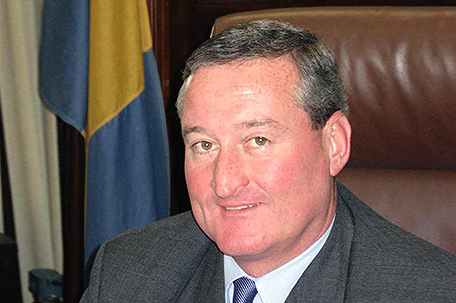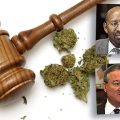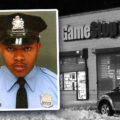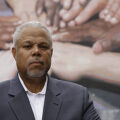
While running for Mayor is a change of pace for former City Councilman Jim Kenney, it’s a change he’s ready to make.
By Denise Clay
For all intents and purposes, Jim Kenney had what amounts to the closest thing to a permanent job that anyone gets in Philadelphia politics as an at-large City Councilman.
Kenney was elected to the office in 1991 and served for six terms before stepping down in January to run for Mayor. At first, Kenney wasn’t a fan of the city’s Resign to Run provision that requires people to step down from the office they currently hold to run for another one, but now he gets it, he said. Holding on to his seat on council would have been the equivalent of working two fairly intense full-time jobs, he said.
“[Running for mayor] is a world apart. It’s a world of difference,” Kenney said. “The intensity, the money you have to raise and the intensity of the schedule…As an incumbent councilman sometimes, you don’t take it for granted, but you’ve been elected six separate times. You know the drill. But this is a different level of stakes. You have to quit your job to do it, and it’s totally different…”
“You know, for years I always thought that it was unfair that we had to resign to run and other jurisdictions didn’t have to like Congress and the State Legislature didn’t have to,” Kenney continued. “But I could never do this job and still be a councilman. I would be torn between missing hearings, missing sessions. The workload in a campaign far outweighs any chance that you have to do anything else. So in a way, I’ve learned a lesson. You probably should resign to run.”
Kenney has the distinction of being one of two current candidates endorsed by the Philadelphia Federation of Teachers, the other being education activist Helen Gym, a candidate for City Council at-large. But while Kenney is the choice for many who describe themselves as “progressive” due to his stances on marijuana decriminalization and public schools, he has a political patron, Local 98 Business Manager John Dougherty, that many have found more controversial.
The SUN sat with the former councilman and talked about his campaign, the group of people who convinced him that now is the time, the ways that schools and law enforcement can work together to make things better for the city, and why New Jersey Gov. Chris Christie should probably keep his day job.
SUN: Thank you for your time today, Councilman Kenney. I guess my first question for you now that you’re officially a candidate is what ultimately made you decide to run?
JK: Twice before, I talked myself out of it. The first time, I was a little too young. The second time, circumstances just weren’t right. This time, I thought about it again, and was almost not running, and then circumstances presented themselves with a crack staff and an organization that was already together. I was approached by a mutual friend of both the campaign folks and me who said ‘These folks would like to work for you.’ And I was gratified that this group would want to work for me. I figured that if I didn’t do it now, I’d never do it. And I’d be frustrated that I didn’t do it. I also believe that as mayor I can do a lot more for folks than I could do as an at-large council member.
SUN: What do you think is the most important thing that we have to tackle as a city?
JK: Poverty, without a doubt. There’s a couple of elements to bringing poverty down. There’s education, number one. Universal pre-K for 3 and 4 year olds; there’s about 28,000 kids in the city that don’t have access to a quality pre-K. They start out school way behind and teachers wind up having to remedially deal with their issues instead of catapulting them forward into the next grade level. That’s one way of improving schools.
Another way of improving schools is by coordinating city services with the schools. Every department in the city has some way of touching schools. Every aspect of school life can be improved by the delivery of city services. We need to coordinate better with our principals and our parents to get them the tools they need to succeed in their schools. And that’s without Harrisburg doing any more than what they’re already doing. We want them to do more, and we think that they have the responsibility to do more. But I’m not going to wait for them to fly in and save the day because I don’t think that it’s going to happen anytime soon, even with a progressive governor who’s a very bright man.
The other issue with poverty is employment for folks who don’t have a college education; employment that will allow folks to buy a house that they can raise a family in and not have to work 40-50 hours a week and still collect food stamps. A living wage is a requirement. Fifteen dollars an hour is minimal when it comes to being able to live. It’s still not enough, but it’s going in the right direction. And I think that industrial style jobs, jobs that allow people to be trained in how to operate a fork lift, work in a warehouse, latch containers on the waterfront, and the like, are the jobs that pay the $15-$16 an hour with health benefits and a pension. They’re usually unionized, and those are the jobs that I’m going to be chasing after for folks who are unemployed, underemployed or are dealing with re-entry from a prison institution. My goal is to have as few of them go back as possible.
SUN: You mentioned returning citizens, folks who are re-entering society from the prison system. Philadelphia is home to 250,000 people who fit this category and according to the Mayor’s Office of Re-Entry Services, 30,000 people will be returning from prison this year. Providing resources to help keep them from returning to the correctional system has been challenging. What will you do to help them if elected mayor?
JK: You’ve got ex-offenders who [help connect returning citizens with resources] who are committed to doing this. They’re doing as consultants for non-profit organizations. We need to get everyone who is serving returning citizens involved and let them know that we hear them and that we know where they’re coming from.
But the other issue is, at least in terms of helping returning citizens find jobs, is that there’s not a lot of jobs to send them to. When you’re sending a returning citizens to a job cleaning up Lincoln Financial Field after an Eagles game, that’s not exactly what I’d consider a poverty-stopping job. But if I can get a young man on the waterfront at an expanded container terminal operation at Southport at the Packer Avenue Marine Terminal, and that person can join the International Longshoreman’s Association and make $50-$60 an hour, that’s a life changing position.
There’s also no reason why the City of Philadelphia couldn’t use its employment opportunities for returning citizens. Certainly, they won’t be police officers, but there’s no reason that they couldn’t work in the Sanitation Department. Or if they’re vetted properly, and have the right background, they could work in Parks and Recreation. There are a lot of things that we can do.
Here’s the deal with re-entry. I’m not afraid of those guys. Those are our people. They shouldn’t be isolated. They should be brought back. If they want to come back and get themselves right, we should embrace them and help them find the skills they need to be outside forever; taking care of their kids and taking care of their neighborhoods and not have us paying $40,000 a year, which is a good yearly tuition at a top university, to house them at State Road. And there are skills in that building. There are people who have craft skills, who have woodworking skills, who have carpentry skills. And we can find ways to get them into the Community College setting, to get them into the labor union setting, to get them the training they need so that they can succeed. I’m not giving up on anybody.
SUN: You are one of the two people in this election that has managed to get the endorsement of the Philadelphia Federation of Teachers. How were you able to get that endorsement and what does that mean to you?
JK: First of all, it means that a committed group of intelligent people who care about our kids every day think that I would do a good job on behalf of our children. I think that the problems facing education in this country and in this city were not the creation of the teachers or the principals. They were the creation of greedy people who want to charterize the entire system for their profit. Now that doesn’t mean that every charter school operator is that kind of person; there are non-profit charters too. Look, charters are going to be here. I’m a proponent of public education and charters are going to be here. But they need to be held to the same standard as public schools, both from a testing level and credential level. And I think that [convention public schools and charter schools] can live side-by-side is the Commonwealth will reimburse us for the costs of charters. Because when a kid goes to a charter, the money follows him. And that’s not fair to the public school system. So I think that the teachers understand that I understand that. Teachers and principals are as important to me as police officers and police captains.
SUN: Really? Most people don’t equate the functions of teachers and police officers.
JK: They serve a similar critical function in the neighborhood by educating young children, making them good citizens and having them succeed and police are equally important with keeping the neighborhood safe and protected. A good principal and a good police captain can run a neighborhood right.
The person that I would point to as almost the paradigm of principals is Otis Hackney at South Philadelphia High School. That’s a man who came in from Springfield, Montgomery County, who had a great life out there, great support, great financing, great supplies and materials, and he decided to be a missionary and come back into town to a troubled school that he has turned around on almost every level. We had two Gates Scholars out of there last year. He’s got a comprehensive school that’s a community school that has a Head Start program, an English as a Second Language program, job placement programs and a health component. We can duplicate what Otis Hackney’s done at South Philadelphia High School at every school in the city. It just takes some effort and some attention because there are folks out there that can help us do these things. And they’re not that expensive. I have a principal at [Andrew] Jackson School named Lisa Kaplan that has a group of Mennonites from Lancaster that come in once a week to take care of their library, and read to the kids and catalogue books. It’s about networking and taking opportunities to bring in other resources, rather than just whine to Harrisburg because they don’t give us enough. They don’t give us enough, and I’ll continue to go there and lobby with our best foot forward. But we need to do what we can do here with our own resources.
SUN: Now you mentioned the Police Department. The relationship between citizens and police departments is something that’s been talked about a lot nationally. What do you see as your role if you become mayor in terms of fostering that relationship?
JK: When I was a young boy, 14, 15 years old, my parents would say to me that if you find yourself in trouble in Center City, or in a neighborhood you’re not familiar with, find a police officer, he’ll take care of you. Now that narrative is not a common thread in African American and minority communities. I want to change that. I want African American parents to able to tell their 15-year-old son that if they have an issue and they’re in trouble, call a police officer. Right now that’s not the case and it’s sad that that’s not the case. When I look at the sacrifice and heroism of [murdered Philadelphia Police Officer] Robert Wilson from the 22nd District, that’s what most of our police officers are like. They’re willing to lay down their life for you. Robert Wilson came out of the neighborhood like everyone else and he was a young man dedicated to being a police officer and gave his life for that goal. He is the model of the kind of police officers we need. That goes with recruiting; making the force more diverse than it is now. It’s more diverse than it ever was, but it can be more diverse than it is now. By continued training on cultural differences and cultural history experiences that they should be aware of and sensitive to.
Certainly, it’s a dangerous world out there. Kids are killing themselves every day and killing each other every day. And police officers are getting killed from time to time. It’s dangerous and violent. But there’s still a way to talk to people, and treat people in a dignified fashion so that they become your partner, and not your enemy. The majority of people in tough neighborhoods are trapped. They don’t want to be there and they don’t want their neighborhood to be the way it is. But they’re trapped. And a small group of hoodlums are the people who give them a hard time. So you shouldn’t treat everyone in the neighborhood like they’re a hoodlum, because they’re not. Saturday at Officer Wilson’s funeral, Chief [Charles] Ramsey, who I think is just a great communicator with people, turned to the 22nd District and said, “I know you’re angry. I know you’re hurt. There’s a lot of anger inside of you because you just lost two officers in almost two years in Officers Moses Walker and Robert Wilson. But I want you to remember how that community reached out to you. How they brought you food; how they had prayer services and how they had vigils; how they hugged you and how they cared about you. You have to show them the same type of love in return, even though you’re hurt and your angry. Don’t let your emotions get away with you because you’re angry.” And that to me is a tough balance. We need officers that have the understanding and the maturity to do that. The people in North Philly are good people. They may be poor. They may be struggling. But they’re good people. You need to treat them with respect while you’re trying to chase down the criminals. The Philadelphia Police Department’s motto is “To Protect and Serve”. That’s it. Protect and Serve. If you’re doing something else, you shouldn’t be doing it.
We’re not Ferguson. We’re not St. Louis. We have our issues, without a doubt. But we have a DA whose willing to lock a cop up for doing something bad, unlike the last DA who wouldn’t do that. [Democratic Mayoral Candidate] Lynne Abraham did not arrest or indict one police officer in 19 years in office. Seth Williams doesn’t have a problem doing that with a police officer that’s acting like a criminal and he’s done that along with the U.S. Attorney’s Office and others. We’ll continue to weed out the bad guys and try to attract good officers to the job.
SUN: One of the things that you got passed while you were in City Council was a bill decriminalizing small amounts of marijuana. And I’m pretty sure that wasn’t something that went over well with the police initially.
JK: Actually, the reaction was diverse. Ramsey in the beginning was not in favor of it. But I gave him a lot of leeway because he’s a police officer, a 35-40 year police officer, and he looks at things differently, so I understood. But to his credit, he called me the day we passed it and he said to me “Councilman, you know my opinion on this. But let me tell you right now, you’re the civilian legislature and we are the police. We follow the law, the law is now different, and we will enforce it to the best of our ability.” And that’s a class act.
But the street cops? They don’t want to be sitting in a station house processing paperwork for 17,000 hours a year, which is what [small marijuana busts] were costing us on the street. They don’t want to put a kid in handcuffs and fingerprint and photograph a kid and put him in a jail cell for something that a lot of us did. What would our lives have been if we had been arrested?
Another issue that comes hand in hand with this is stop and frisk. My son, who will be 26 in May, has never been stopped and frisked. I’ve never been stopped and frisked, and what do you think the common thread in that story is?
SUN: You’re White guys.
JK: Right. White guys never get stopped and frisked. Stop and frisk is obnoxious because if you’re a police officer and you feel threatened that somebody might have a weapon, you have every right to pat that person down. But to stop a kid twice a month or so with a backpack coming home from school or going to work? To me that just sets up the system for failure because now that young man has a very different attitude about police than he did before he had that hassle. Maybe it served a purpose at one time, but it doesn’t serve a purpose anymore.
SUN: So if you become mayor, stop and frisk is gone?
JK: Yeah. I’m not going to say that a police officer can’t frisk someone if they feel they’re in danger, but this written policy, this written directive of stop, question and frisk, is offensive to people. And I don’t blame them for being offended.
SUN: From what I understand, you have the first televised ad…
JK: It’s not my ad! I have no idea. I don’t want to know.
SUN: But it’s kind of garnered some consternation from people because it’s an outside group and that it’s not you that’s doing it.
JK: It’s not me and I can’t stop them because the Supreme Court told them they could do it. And one other candidate I know at least is going to have one doing commercials for him and I find no fault with that. It’s just the way it is. Do I wish this was the case? No. I wish that we were playing by a clear set of rules where people were limited in what they could give and were transparent about who they are. But that’s not what the Supreme Court said, and until we get that changed, this is what our system is going to be despite the fact that we put in really good campaign finance restrictions. They’re going to be circumvented until this court case is either overturned or something else is done to make these people have to reveal themselves and limit their donations. But I don’t coordinate with them. I don’t talk to them. Now do I think that it’s a good commercial? Yeah. But I didn’t authorize it and I don’t have to because the Supreme Court said that they have the right to do that under the First Amendment.
SUN: When you’re out there on the campaign trail, what kind of reactions are you getting from people?
JK: I’m getting a lot of love. I was at [National Coalition of 100 Black Women’s] Madame CJ Walker Luncheon on Saturday and there were 700 folks there, mostly women, mostly African American, and my reception was awesome. I felt lots of hugs; lots of ‘selfies”, lots of pictures…You know when someone is being nice to you just to be polite and you know when they’re really glad to see you. They were glad to see me. Now will that translate into a vast majority of African Americans voting for me? I don’t think so. But it does translate potentially into a goodly portion of folks that know my heart and what I feel and what I think and are willing to accept me despite the fact that I’m a White guy.
SUN: Now I remember you saying when you first announced that you were running that you weren’t buying into the “racial calculus” or “racial math”.
JK: I reject it! Because if you don’t reject the ‘racial math’, you’re going to be mired in past history when people did vote based solely on the color of a person’s skin. I find that African Americans have voted for White people more than White people have voted for African Americans. I voted for Wilson Goode twice over Frank Rizzo because I just rejected that approach to governing.
We have to get past that. I voted enthusiastically for [President Barack] Obama twice. Now have I agreed with everything he’s done? No. But he gets credit for nothing. Not for saving the auto industry. Not for saving the economy. Not for getting Osama bin Laden. That man gets credit for nothing. And the reason why is that there’s a segment of this country that doesn’t want to see a Black man get credit for being a success as president. They want him to be the last Black president and they’re going to do everything they can to trip him up and they don’t care if it means taking the country down. I thought when Obama got elected that it was this big hurdle we had finally gotten over. And then, out of the basement came the haters, out from under the rocks. They used to be hiding before, now they’re out in front.
SUN: Now I will end this interview with a totally innocuous Philadelphia Eagles question. It’s a question about the ‘Tweet’ that you sent out about New Jersey Gov. Chris Christie after seeing him in Dallas Cowboys owner Jerry Jones’s box at Lincoln Financial Field cheering the Cowboys. For a lot of people, that ‘Tweet’ made a lot of people say “I’m gonna vote for that guy!”
JK: I didn’t get any negative feedback from that. The reason I did it was because I was angry. If you’re going to be President of the United States, you should have spent half of the time in Jeffrey Lurie’s box, not high-fiving Jerry Jones because the Eagles are losing. A lot of the people who come and support the Eagles are your citizens in the Southern part of New Jersey are Eagles fans. It’s an Eagles fan base. Most of the people who go to the Jersey Shore and pay your real estate taxes, patronize your businesses and keep your shore towns afloat are from Pennsylvania; from Southeastern Pennsylvania. So you’re insulting two classes of people.
[Gov. Christie] has a propensity to tell people off when he wants to. It’s easy to be brave when you have four state police officers with you all of the time. So I didn’t feel bad saying that to him, because he would say that to me. Now would I do that again? Well, I have a campaign staff that would probably stop me….
SUN: Well, thank you so much for your time. I really appreciate it.
JK: Thank you…

















Leave a Comment